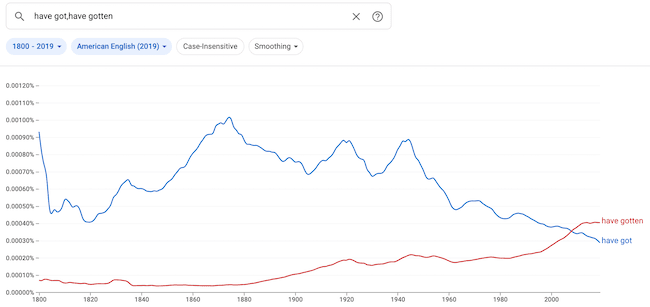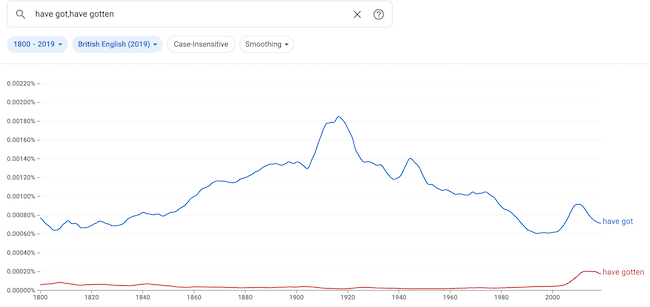
The verb get is unusual because it has two different past participles: gotten and got.
You might think that the preference for either one is simply between US and British English usage.
But it’s more complicated than that because the two words have different and distinct uses.
Making the right choice is not so much a preference but about understanding when each one is the correct option.
Using got and gotten appropriately
If you believe that you can split these two past participles into US and British English usage, it’s a reasonable assumption. Looking at the usage of have got and have gotten gives a few clues.

US English uses gotten more frequently than got, but it’s not a dramatic difference.

However, in British English, the ‘en’ form is making small inroads in use, but have got is still the most used.
Perhaps these changes are due to the Internet or more writers understanding the difference between these two words.
In short, the difference is that got often refers to a state where nothing changes, while gotten implies an ongoing process.
State: I’ve got two children.
Process: She’s gotten much better in the last couple of months.
When you grasp this subtle difference, you can use either form with more confidence.
We use get a lot in writing
The verb get is one of the most common verbs in English because it has over forty different meanings.
If you add all the get phrasal verbs, it’s an even longer list.
That’s why it occurs so often in writing.
In the present and simple past forms, it’s always get and got.
But in the perfect forms with have/has/had, the past participle can be either got or gotten.
Sentence examples of gotten and got
In many instances, you can use either form.
Luckily, both my children have got into medical school at university.
Luckily, both my children have gotten into medical school at university.
Anna was thrilled to learn that she’d got a promotion.
Anna was thrilled to learn that she’d gotten a promotion.
There is little difference in meaning between these two sentence pairs. But the second sentences in the examples would be more common in the US.
Where it can get a bit tricky is when referring to a process compared to a state.
I’ve got used to living in France.
In this sentence, you are saying that it is a perfectly normal state now.
I’ve gotten used to living in France.
But in this sentence, you are saying that it was a process over a period of time before it became a normality.
It’s a similar difference between the following sentences.
The economy hasn’t got any better under the new government.
The economy hasn’t gotten any better under the new government.
The second option is better here because it explains a process, but it would be more common in US English.
Gotten as an adjective
Past participles are often also adjectives.
Here are two examples.
He supplied a written statement to the police.
It was so long ago, in a forgotten time and place.
Although rare now, we still use a few fixed expressions using gotten as an adjective.
Critics warn of loopholes as UK government tries to stop oligarchs attempting to hide ill-gotten gains. The Guardian.
That’s what they call ‘ill-gotten wealth. New York Times.
Together we melted into the nearby maize field to devour our ill-gotten contraband. Lexico.
The thieves were found in possession of their ill-gotten booty – a 2-baht-weight gold necklace. Lexico.
Which one should you choose?
There’s no right, wrong, or grammar mistake in using either one.
If you are writing in US English, you are much more likely to use gotten far more often than if you write in other forms of English.
But for me, I’ve got no problem with them, and in fact, I’ve gotten accustomed to how each one can be used effectively.
It’s more of a style choice than a grammar point.
However, if you want to be sure you make the best choice, think about the difference between a state and a process.
Related reading: Double Negatives In Writing Are Not Always A Mistake



